… because ports cannot function effectively without trained people
Machines may give a port some capabilities but, by themselves, they will not make a port great. People do … those that are trained to operate the systems, perform the routines and apply diligence are essential for delivery of dependable, efficient port services.
The supply chain, as with all others, is no stronger than its weakest link. And seaports account for many links in the global supply chain. It is an economic as well as a social imperative that persons employed to implement, perform or supervise the various systems, processes and routines and effectively trained and qualified.
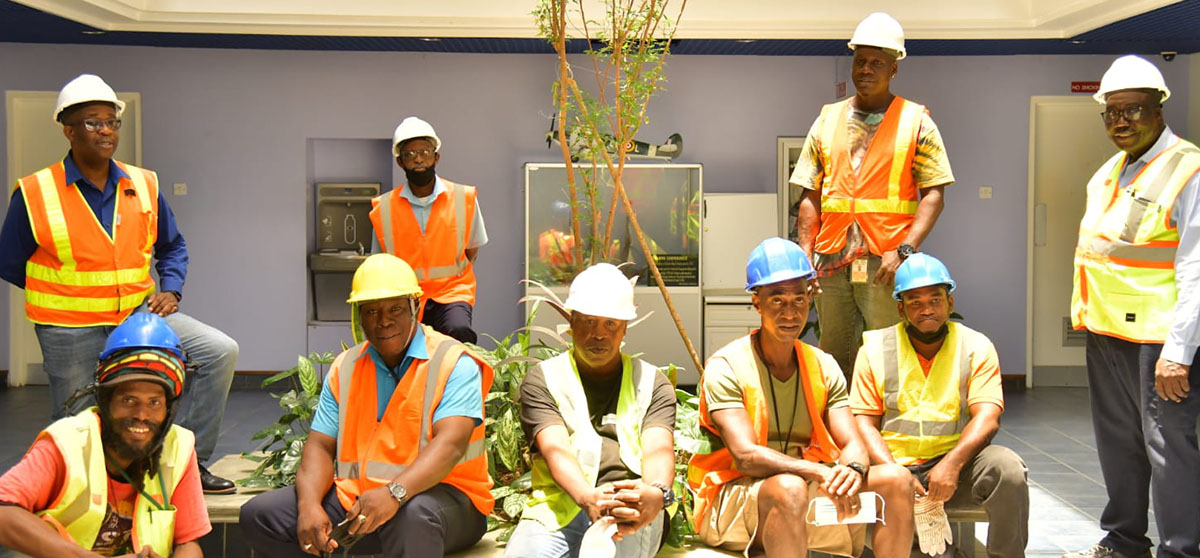
Ports should therefore always be engaged in training and development of their human assets, building teams of motivated employees and cadres of knowledgeable supervisors and lead hands … more so in island-states where most of the food and the basics of life arrive through the seaports.
Stevedoring Foundation Skills Level 1 Training and Certification
In 2021, 66 employees from four Caribbean countries received the training necessary to deliver effective port services. The training programme for Stevedores, developed by the Port Management Association of the Caribbean, was designed for the servicing of cargo ships and improvement in the safety, efficiency and productivity of cargo terminal operations.
Antigua and Barbuda Port Authority enrolled nine employees; Saint Lucia Air and Sea Port Authority, 40; St. Christopher Air and Sea Port Authority, 7; and, St. Vincent and The Grenadines Port Authority (SVGPA) registered 10.

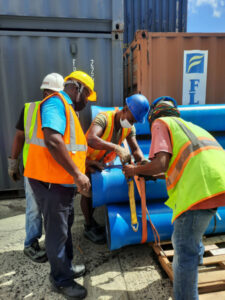
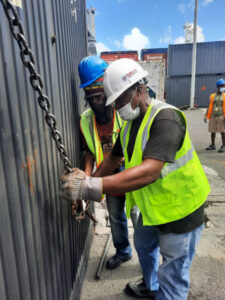
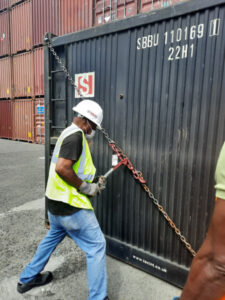
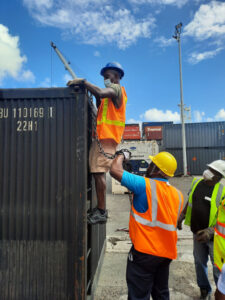
The Institute for Industrial Solutions (IIS) was the lead facilitator for this intra-regional training exercise, with support of the Caribbean Maritime University (CMU). And course material was designed to meet participants’ development needs and training modes, virtual and face-to-face. The Caribbean Association for National Training Agencies (CANTA), Caribbean Vocational Qualification (CVQ) CANTA-CVQ for Stevedoring Foundation Skills Level was adopted as the training, assessment, and qualification framework standard. And the practical activities that were conducted at Castries seaport, Saint Lucia, were supported by members of the management team who were trained in planning, conducting, and reviewing assessments by IIS.
The programme’s delivery utilized an integrated approach including virtual and face-to-face practical training of the modules (see table below), and range of activities consistent with the requirements for certification under CVQ or NVQ framework. As Osric Forrest, Workforce and Organizational Development Specialist at the IIS explained in his report, ‘… adaption of the CVQ curriculum to support the programme design and delivery ensures that participants who are recommended for CVQ/NVQ certification will not be required to complete additional training to be certified, since the process includes assessment and certification.’
Training hour components for the contact sessions, from April to August (2021), were:
- Total Nominal Training =120 Hours.
- Virtual Training, including Practical Training Videos = 50 hours.
- Face to Face Training, Videos, Working Sessions, and Demonstration = 55 hours.
- Total Hours for Practical, Simulated Activities and Assessment Exercises = 15 Hours.
- Training was scheduled biweekly (Thursday and Friday). All training activities were guided by a Range of Knowledge, Skills and Competencies as outlined in the Caribbean Association for National Training Agencies (CANTA) approved CVQ Qualification Plan, and related Competency Standards for Stevedoring Foundation Skills Level 1.
A total of 172Foundation skills training 2021 certificates were issued across the programme.
1- Caribbean Maritime University: Professional Certificate of Competence in CVQ Stevedoring Foundation Skills Level -. Saint Lucia Air and Sea Ports Authority, 22 candidates
2- Institute for Industrial Solutions and PMAC: Certificate of Training in Fundamentals of Workplace Communication and Security Procedures – Saint Lucia Air and Sea Ports Authority, 22 candidates
3- Institute for Industrial Solutions and PMAC: Certificate of Training in Fundamentals of Basic First Aid Duties – Saint Lucia Air and Sea Ports Authority, 22 candidates
4- Institute for Industrial Solutions and PMAC: Certificate of Training in Fundamentals of Computations, Data Entry and Retrieval Procedures – Saint Lucia Air and Sea Ports Authority, 22 candidates
5- Institute for Industrial Solutions and PMAC: Certificate of Training in Fundamentals of Rigging Operations – Saint Lucia Air and Sea Ports Authority, 22 candidates
6- Institute for Industrial Solutions and PMAC: Certificate of Training in Occupational, Environment, Health, and Safety (OEHS) – Sixty-two (62) participants were certified as follows:
- Antigua and Barbuda Port Authority, 8 candidates
- Lucia Air and Sea Ports Authority, 39 candidates
- Saint Christopher Air and Sea Port Authority, 6 candidates
- Vincent and the Grenadines Port Authority, 9 candidates
⌊Recommendations ___________________
The IIS made the following post-event recommendations:

- There is a need to continue the training for port workers to address challenges related to providing effective supervision, mentoring, and coaching for staff. Multiple certifications offered provide the framework for each participant to be successful.
- Providing subsequent refresher training as well as individual support and supervision for all trained staff appears to be crucial for a successful integration of industry and performance standards in the operations of the port.
- Overall improvements should be observed in Occupational Health and Safety, productivity, and coordination of work activities to include attendance. Focus areas should include handling of gears and cargo, reduction in accidents and near misses while executing work activities.
- The PMAC Port Worker Development intervention was intentionally designed in a pragmatic and modular manner to enhance easy learning by participants. Therefore, supervisory and management personnel need to make sure that employees are fulfilling their obligations.
- In addition to individual support and supervision, a team-approach would be appropriate so that most untrained personnel would learn from their colleagues and apply basic theoretical, and practical training.
- Continued support for the development of the Stevedores will be achieved by engagement of the participants through a WhatsApp group. This group will be used as an information and communication center for related topics and building of a strong work relationship between certified and empowered employees.
- There is a need to continue the training for port workers to address problems related to providing effective supervision, mentoring, and coaching for staff. In addition, those who did not attain the training standards as well as other employees who did not attend should be encouraged to take part in future interventions. []





